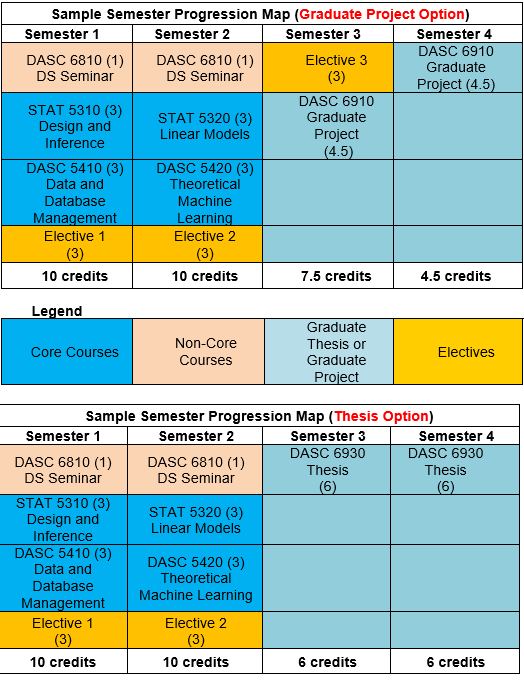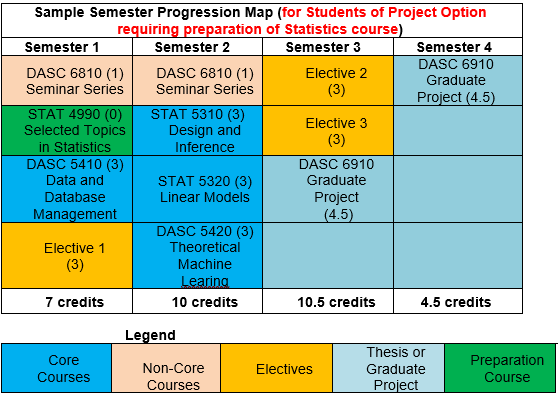Science Menu
Program Structure
- A 32-credit program.
- Consists of four core courses and additional elective courses.
- Students choose between two completion options: a graduate thesis or a graduate project.
- With full-time study, the MScDS program is designed to be completed in four semesters.
Note: Some students may need additional time to complete their thesis or project. Extensions must not exceed five years from the start of the program and must be continuous across Winter, Summer, and Fall terms.
An extension fee applies for each additional term. For current extension fees, please refer to the official tuition and fees page: https://www.tru.ca/current/enrolment-services/tuition.html
Case studies, class participation, research papers, student presentations, guest speakers, industrial visits, applied projects and other experiential methods will be used to enhance and evaluate learning.
| Course | Credits |
|---|---|
| DASC 6810 (graduate seminar) for two terms | 2 |
| DASC 6910 (graduate project) | 9 |
| MScDS core courses | 12 |
| Elective courses | 9 |
| Total | 32 |
| Course | Credits |
|---|---|
| DASC 6810 (Graduate Seminar) for two terms | 2 |
| DASC 6930 (Graduate Thesis) | 12 |
| MScDS core courses | 12 |
| Elective courses | 6 |
| Total | 32 |


STAT 5310 Statistical Design and Inference for Data Science (3,1,0) STAT 5310 Statistical Design and Inference for Data Science (3,1,0)Credits: 3 credits This course will provide students with an understanding of statistical designs and inference with a focus on computational statistics. The course will expose students to useful classical statistics including various experimental designs and sampling, the likelihood, principles of estimation and hypothesis testing. Students will also learn about more modern variants including areas of computational statistics such as Bayesian statistics, resampling, and Gibbs sampling, simulation, and methods for missing data.
Prerequisites:
STAT 2000 or equivalent and MATH 2110 or equivalent and successful completion of at least one university level computer programming course.
Recommended Requisites:
MATH 2120 or equivalent, MATH 3020 or equivalent, STAT 3060 or equivalent, STAT 4040 or equivalent, or STAT 3050 or equivalent |
STAT 5320 Linear Models for Data Science(3,1,0) STAT 5320 Linear Models for Data Science(3,1,0)Credits: 3 credits This course will expose students to the theory and applications of linear models from a statistical paradigm. A review of basic multiple regression and diagnostics will be followed by the theory and applications of mixed models and generalized linear models. Advanced regression including nonparametric regression and penalized regression will be covered.
Prerequisites:STAT 3060 or equivalent, MATH2120 or equivalent, MATH1240 or equivalent and successful completition of at least one university level computer programming course
Recommended Requisites:STAT 3050 |
DASC 5410 Data & Database Management for Data Science (3,1,0) DASC 5410 Data & Database Management for Data Science (3,1,0)Credits: 3 credits This course is a comprehensive survey of concepts related to the management and manipulation of databases for data science endeavors. Core topics related to the theory and nature of working with data and databases, as well as contemporary and advanced methods for working with complex and/or large amounts of data will be covered. This course is designed to prepare data science professionals and researchers to key concerns in data management and approaches to address them.
Prerequisites: COMP 1130 or equivalent
Recommended Requisites: COMP 3610 or equivalent |
DASC 5420 Theoretical Machine Learning(3,1,0) DASC 5420 Theoretical Machine Learning(3,1,0)Credits: 3 credits This course will study the theory and applications of many foundational machine learning methods. Several supervised, semi-supervised and unsupervised learning approaches will be explored, including Bayesian methods, decision trees, kernel-based methods and neural networks methods, as well as areas of clustering and dimension reduction. We will also discuss how to model problems as machine learning problems. Methods discussed will be applicable to natural language processing, speech recognition, computer vision, data mining, adaptive computer systems and other areas.
Prerequisites:STAT 3060 or equivalent,STAT 3050 or equivalent ,MATH 2120 or equivalent, MATH 2111 or equivalent , Successful completion of atleast two university level computer programming courses
Recommended Requisites: STAT 5310, STAT 5320 DASC 5410 |
MATH 5210 Advanced Modelling Techniques (3,1,0) MATH 5210 Advanced Modelling Techniques (3,1,0)Credits: 3 credits The objectives of this course are to learn to apply mathematical tools to solve open-ended, real-world problems, to understand the benefits and limitations of mathematical modelling, and to critically assess the predictions based on mathematical models, as well as to stimulate interest in studying more advanced mathematics topics (e.g. numerical analysis, differential equations, probability and statistics, and optimization.)
|
MATH 5220 Advanced Optimization Methods (3,1,0) MATH 5220 Advanced Optimization Methods (3,1,0)Credits: 3 credits In this course, we introduce discrete optimization and expose students to some of the most fundamental concepts, techniques and algorithms in the field. It covers linear optimization, integer and mixed programming, network optimization, goal programming, multi-criteria decision analysis, constraint programming, and game theory. The techniques and algorithms will be applied to complex practical problems in areas such as scheduling, network security, social network, vehicle routing, supply-chain optimization, and resource allocation. Students will do a project on an application of their choice.
|
DASC 6210 Data Analysis in Business and Economics DASC 6210 Data Analysis in Business and EconomicsCredits: 3 credits This course will provide students with applications of data science in business and economics. Students learn to integrate personal judgment and intuition in realistic business situations with the most widely applicable methodologies of decision and risk analysis, probability and statistics, competitive analysis, and management science. Topics include an introduction to decision analysis and modelling; spreadsheet engineering and error
reduction; framing decision analysis problems; framework for analyzing risk; data analysis; resource allocation with optimization models; multi-period deterministic models; multi-factor deterministic models; regression modelling;strategic interactive decisions; and interpreting models, data, and decisions.
|
DASC 6310 Data Analysis in Biology and Life Sciences DASC 6310 Data Analysis in Biology and Life SciencesCredits: 3 credits This course focuses on the development of research skills required for framing strong hypotheses and performing robust experiments using large biological and biochemical data sets. Beginning with an introduction to genome evolution, organization and regulation, the major goal of the course is to develop skills for framing important biological hypotheses and deploying appropriate tools for testing those hypotheses. Approaches for data quality assessment and evaluation of computational tools is a major theme, and laboratory time will provide hands-on experience with analysis of DNA, RNA and protein sequence data, and the regulatory networks controlling gene expression and metabolic activity. Focus will be placed on experimental design, interacting with data in local and public databases, version control, documentation, and conducting reproducible research.
Prerequisites:DASC 5410. Knowledge of Linux system and skills of computer programming will be an asset. |
DASC 6510 Selected Topics in Data Science( 3,0,0) DASC 6510 Selected Topics in Data Science( 3,0,0)Credits: 3 credits Students explore various topics related to Data Science. Course topics vary to ensure a timely coverage of new
techniques, software, theories, and trends.
Prerequisites: DASC 5410 and DASC 5420 . Also approval by the MScDS program coordinator |
DASC 6520 Data Analysis in Data Science DASC 6520 Data Analysis in Data ScienceCredits: 3 credits In this independent study course, students investigate a specific topic of interest in Data Science. Course content is mutually determined by the instructor and the student.
Prerequisite : DASC 5410; DASC 5420 and approved by MScDS program coordinator . |
DASC 6710 Work Experience DASC 6710 Work ExperienceCredits: 3 credits Hands-on work experience undertaken by a student is an integral part of Data Science program. Work experience provide opportunities for the program and its community to combine resources to further the student's knowledge, personal interest, career path and employability skills through activities at work sites. Therefore, students taking a job related to data analysis can earn work experience credits. The typical work includes a research assistant job in statistical analysis, or data analyst in a financial, IT or industrial organization. Usually the minimum length of employment to qualify for 3 credit is 12 weeks. Students may earn up to maximum 6 credits (e.g., an 8-month job or two 4 month jobs). |
DASC 6810 Data Science Seminar (0,1,0) DASC 6810 Data Science Seminar (0,1,0)Credits: 1 credit To cope the rapid-change of knowledge, software, techniques and directions in Data Science, it is important for students and instructors to stay on top of the growths and progresses in this fast moving discipline. The nature of inter-disciplinarity of Data Science also demands the students to be aware of the methods and applications from wide range of backgrounds and to learn beyond the course content of the program. To serve these purpose, the seminar and colloquium series will invite scientists and technology leaders to present the current developments and progress in big data and data analytics, to showcase the successful applications in real-world. This is also the opportunity for students and faculty to share their research ideas and results. |
DASC 6910 Graduate Project on Data Science ( 9,0,0) DASC 6910 Graduate Project on Data Science ( 9,0,0)Credits: 9 credits Students in the Graduate Project Option in the MSc in Data Science program prepare and defend a report that address a particular data science issue or problem. The report is completed under the direction of a faculty member and evaluated by a project defense committee.
|
DASC 6930 Graduate Thesis DASC 6930 Graduate ThesisCredits: 12 credits ***Please note: DASC 6930 is a full year course. Students choosing this course in Fall must also register for the same section for it in Winter and vice-versa.***
Students in the Graduate Thesis Option in the MSc in Data Science program undertake an independent research project of relevance to data science, generating original theoretical contributions that advance the body of literature in this field, prepare and defend a thesis in accordance with the policies established by the Research, Innovation, and Graduate Studies Office. The thesis is completed under the supervision of a faculty member and a thesis supervisory committee and evaluated by a thesis defense/examining committee.
|
| The list of all eligible faculty members can be viewed here under supervisors. |

